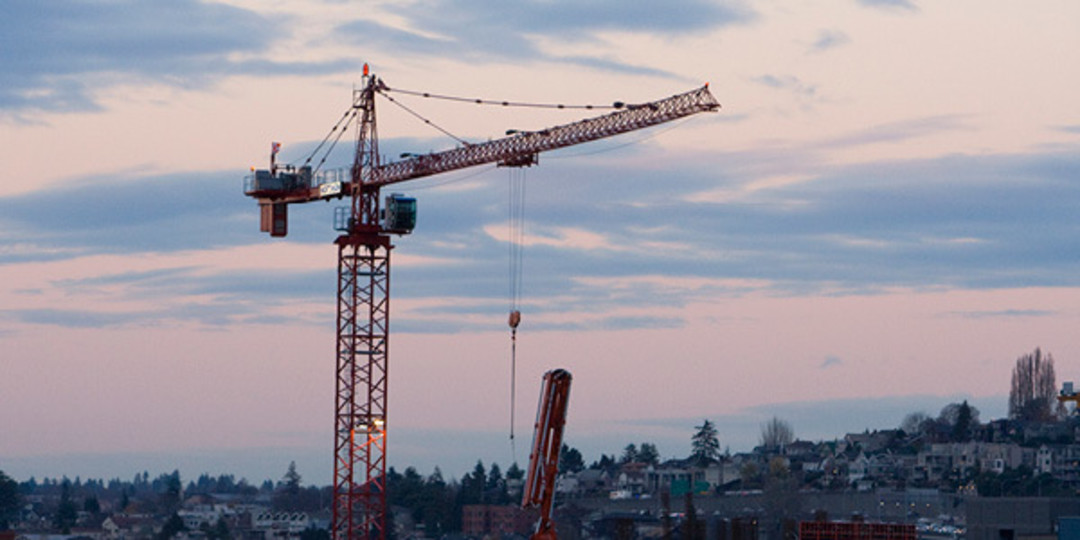One Question: Is There Any Common Ground on Affordable Housing?

One Question
Two weeks ago, I published a guest op-ed by one of Seattle's most on-point urbanists, Dan Bertolet. It was titled "Expensive New Housing Reduces Displacement," and it's at 150 comments now (well, 147, after I deleted some of the execrable and personal ones).
One consistent theme that critics gravitate toward when arguing with development devotees like Bertolet is the supposed hipster—or in more political terms, bourgeois—leanings of his agenda.
"Supply and demand will drive the prices of those houses up to the point where their children and grandchildren will not be able to afford to live in those houses. That's what their good-hearted preservation methods are doing."
So, when I saw third-generation local blue-collar curmudgeon David Freiboth, the executive secretary of the King Count Labor Council, seconding Bertolet's supposedly elitist development POV with a knockout sound bite in The Seattle Times this week, I sensed an opportunity to identify some common ground among Seattle's bickering left-wing factions.
The Seattle Times article was about this year's districted city council elections where density and growth—which should be added to religion and politics as verboten topics at the Thanksgiving dinner table in this town—are front and center.
In The Seattle Times, Freiboth boiled it all down to this:
Freiboth thinks the city must allow more high-density housing as it grows.“I’m concerned neighborhood issues will trump the things we need to do citywide to make this place more livable and affordable,” the union leader said. “Resistance to density (will push) housing prices up and lower-income people out of town.”
Thinking he'd make a great Q&A (and a perfect followup to the discussion Bertolet ignited), I had a quick text exchange with Freiboth wherein he had me sussed. "Your news item here," he texted, "is, 'older, white, rough-around-the-edges, stereotypical up from ranks labor leader gets it on urbanization!' No way it wouldn't totally go viral," he joked.
We transitioned to the phone.
I started off letting him know that his quote probably sounded counterintuitive to most lefties who see the situation in the exact reverse, arguing that new development makes Seattle more pricey and nudges low-income people out of town. (See lefty city council member Mike O'Brien's linkage fee which will charge developers a fee on new construction because of the supposed link between new development and skyrocketing housing prices.)
Freiboth:
I think those that feel density pushes up housing prices are making an emotional argument. It's intuitive for them because it's new housing and it's replacing old housing, and that equates to more expensive housing. But it's the wrong calculation. The calculation really revolves around the availability of units. It's the old-fashioned supply and demand. If the supply gets restricted and doesn't respond to the demand, what happens to prices? They go up.
People that have trouble with that logic, I don't think they understand the rate of growth here. And it's hard to fathom. I've lived here my whole life. I'm third generation. And it's hard to internalize that if we don't deal with the rate of growth in a new way...if we don't add housing units, it's going to drive the price up. It's that simple.
Seattle's recent growth is startling. In the last three years, Seattle has added 43,000 people—a 7 percent jump. In contrast, Seattle grew 8 percent between 2000 and 2010. Seattle, current population 652,400, is expected to add another 120,000 people in the next 20 years
Freiboth:
Preserving low density, affordable housing is well intentioned, but it's misguided just based on the facts of supply of demand. This isn't about developers or gentrifiers. All those elements are in play, which makes this a difficult conversation because there are greedy developers out there that are trying to take advantage of the market. There are people that will have to give up older housing. That's real and that's emotional, and that's not to be minimized. But trying to ignore the reality of growth means that if we don't find the compromises necessary to deal with our growth, we're going to turn into San Francisco where it's a city of well-heeled people and homeless people. The middle class does not live in San Francisco because of the same dynamics that we're dealing with here. There was a resistance to density in San Francisco to preserve old housing. That's an inefficient use of land.
Of course, San Francisco is also Exhibit A for the very people Freiboth is challenging—people who believe the Amazoning of Seattle is turning Seattle into a playground for the wealthy. For an in-depth discussion on San Francisco, read TechCrunch's exhaustive history of the San Francisco housing market, which concludes with yet another philosophical conundrum: "So while Google may not be opening a giant office in Detroit anytime soon, the people of Detroit and the Midwest are coming here."
There's a pretty obvious followup question for Freiboth, though. As a labor leader, doesn't he have a vested interest in promoting development (a boon for construction jobs)?

Freiboth:
Am I trying to look for opportunities to put people in family wage jobs? You bet. It's good for the economy, good for the tax base, good all the way around. But residential housing is a conundrum for labor. When you're talking about midrise [development], the developers get around unionized workers. The density that you see in these neighborhood cores, that's not the kind of projects we get. There's not a symbiotic relationship in housing with developers with that type of housing. People can stereotype what we advocate for all they want. But what I'm worried about is workforce housing. That's my concern. I want people that work in Seattle to live in Seattle. And that's going to take more density, not less.
The problem we get into in this town is that when we try to gather folks civically to work on housing, it's dominated by developers, or it's dominated by the low-income advocacy community that sees any resources not directed toward low-income people as taking away resources from those who need it most. There should be a coalition devoted to workforce housing. And that doesn't seem to be developing because of these two forces.
If the debate comes down to whether policy should be dominated by developers or homeless advocates, there isn't room for a discussion about housing that isn't dominated by emotion. I think a lot of the resistance on the left is rightfully an emotional reaction to the omnipresence of big-money players—Vulcan, Amazon, Microsoft. It's natural that lefties are going to think that whatever they want its bad.
With that kind of political hurdle, I asked Freiboth how density could become a progressive cause. How do you get to a place where it's not jarring that the blue-collar labor guy is for density, and in fact that it makes 100 percent sense?
Freiboth:
I tried working on this years ago when Charley Royer convened a group on workforce housing. And it fizzled because we got caught in this bind between the development community that wanted less regulations and the homeless advocates that wanted every public resource directed to homelessness. We just couldn't get any traction and Charley moved on.
The challenge we're going to have is with the neighborhoods. People are resistant to change, and they see density as a threat to the neighborhoods, to the character of neighborhoods. But this is a workforce housing issue. This is a social equity issue. Providing more units is a social equity issue. Preserving old units in the old low-density model is a dead end. It's well intentioned, but it's a dead end. Because we're growing too fast for that to work.
The only lefty way to deal with that is rent control. You just regulate the hell out of property owners and you create an artificial market that will only last as long as you have a government that supports that. But we all know that changes over time. The practical approach is a regulatory environment and market solution. You've got to allow developers to produce more units, and we've got to force developers to put in workforce housing. So, the developers are right and the advocates are right. So there is common ground.
When candidates come to me and say, 'Dave, what's the number one issue?' And they expect me to say, 'Oh, gotta make sure people can organize into unions.' But I say, it's density. And they look at me like, 'What?' It's density. If we don't create more units in this city, workers will not be able to live here, we'll price them out the place. This will not be a blue-collar town. We can't just regulate our way out of this thing. There's just too much growth.
Freiboth says he finally understood the issue when he found himself at odds with the developers and the neighborhoods when developers, unable to build in the 65 percent of the city that's zoned for single-family development, set their sites on his turf, industrial land. That's when he realized the there was a zoning problem that protected single-family homes—ironically driving up prices for families.
"The real sad part," he concluded, "is they're guaranteeing that their grandchildren can't live in the houses they grew up in. It's not because of evil developers, but because of the unprecedented growth. Supply and demand will drive the prices of those houses up to the point where their children and grandchildren will not be able to afford to live in those houses. That's what their good-hearted preservation methods are doing."




